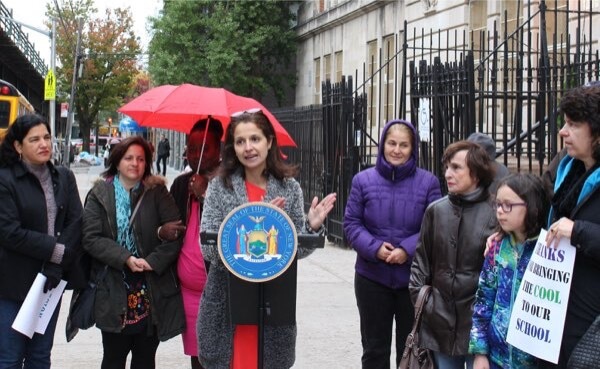By Bill Parry
Students and teachers at PS 85 will finally enjoy some peace and quiet, and some cool air, too, thanks to a $125,000 grant from the New York State Assembly. All classrooms with windows facing the elevated subway tracks over 31st Street are getting air conditioners, Assemblywoman Aravella Simotas (D-Astoria) announced last week.
“For far too long, teachers and students have been forced to choose between stifling heat if they keep windows closed or interrupted lessons from the noise of passing subway trains, when they open the windows,” Simotas said. “The choice between these two atrocious conditions was an impediment to learning. I’m proud I was able to secure funding through the Assembly to finally end the long-running battle that parents and teachers have waged to end the noise pollution at PS 85 in Astoria.”
When the school was built in 1907 there was no subway line along 31st Street. The elevated line went into service in 1917 so for nearly 100 years the teachers and students had to choose between heat and noise.
“The noise pollution endured by our children has always been a major concern to families and the school community, and we all worked in unison to get where we are today,” PS 85 Principal Ann Gordon-Chang said. “I am extremely elated that classrooms are being equipped with air conditioners.”
The Department of Education installed sound-absorbing acoustic tiles on the school walls and two years ago the MTA installed noise dampeners and other measures, but the problem persisted. Last moth 31 air conditioners were installed and the remaining 10 will be in place by the end of the year, ensuring a better learning environment this spring.
“This is incredibly good news for students and teachers who will no longer have to choose between the lesser of two equal evils,” PS 85 Parent’s Association President Lisa Tapper said. “With air conditioners, students’ focus will increase, they’ll learn better and will no longer stumble out of stifling hot classrooms like a pile of goo.”
Arlene L. Bronzaft, Ph.D, an environmental psychologist who has been studying the effects of noise on behavior and health for more than 30 years, published a ground breaking study in 1975 of students at a Manhattan school near the elevated No. 1 line that found students in classrooms that faced subway tracks performed measurably worse on reading tests than students on the quiet side of the building.
“With my early research and other academic studies demonstrating that noise can intrude on classroom learning, I am pleased that PS 85, which is situated so close to the elevated train tracks, will now have air conditioners,” Bonzaft said. “Teaching and learning will be far less impacted by passing train noise during the warm months with windows that can now remain closed.”
Reach reporter Bill Parry by e-mail at bparr



































